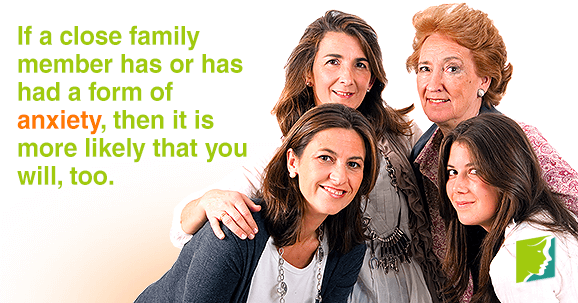Anxiety, a feeling of unease, is functional when a person is faced with a scary or unfamiliar event. In most people, the feeling subsides soon after the perceived threat has disappeared, but some people can experience a chronic sense of anxiety, at which point it is no longer functional and becomes a clinical condition. Keep reading for more information about anxiety, including the causes, symptoms, and useful tips.
What Are the Symptoms of Anxiety?
There are many psychological, physiological, and social symptoms associated with this condition, and every anxiety sufferer experiences the condition differently. A few of the possible symptoms that signal anxiety are:
- A chronic feeling of unease or dread
- Irritability
- Inability to concentrate
- Palpitations
- Headaches
- Hyperventilation
- Restlessness
- Excessive sweating
Keep reading for more information about the causes of anxiety and how to deal with it.
What Are the Causes of Anxiety?
The causes of anxiety are numerous and often overlap, creating a complex interplay of many different biological, psychological, and environmental factors. A few of the known triggers of this condition are listed below.
Hormonal imbalance
During perimenopause, progesterone production decreases, and the symptoms of anxiety often appear because progesterone is known as a calming hormone. Without progesterone, women may begin to feel more overwhelmed and easily stressed. However, there are many things you can do that will help your hormones stay regulated. There are also some lifestyle changes and herbal remedies that may be useful.
Living through a traumatic event
Anxiety can come about immediately or manifest itself years later. Examples of events that have been known to trigger anxiety are warfare and child abuse.
Family history
If a close family member has or has had a form of anxiety, then it is more likely that you will, too. This is not to say that chances cannot be reduced through controllable lifestyle factors, nor to say that people with no family history will not develop the condition, but it is a risk factor. This could be for genetic reasons, or through learned negative thought patterns and behaviors.
Unhealthy lifestyle factors
A sedentary lifestyle and a diet lacking in essential nutrients are more likely to leave the person feeling anxious and unhappy. Not only does this have to do with physiological reasons, but such lifestyle choices can lead to loneliness and weight gain, both of which can cause psychological feelings of stress and anxiety. Increasing the levels of natural mood-enhancing endorphins in the body through exercising and eating a diet high in fruits and vegetables will help the body function normally and keep anxiety at bay.
Stress
Stress is known to lead to anxiety because of the rise in cortisol levels and also because of the negative thought patterns stress can perpetuate. Stress triggers can include grief, work, family responsibilities, and financial worries. Unfortunately, modern life makes stress difficult to avoid, so developing effective stress management techniques are the first step towards alleviating anxiety.
Illness
There are some illnesses that have anxiety as a possible symptom, so people with these conditions are automatically at a higher risk. Such illnesses include an overactive thyroid and arthritis.
Anxiety is a complex condition, and much of the time, the symptoms will feed into each other and overlap. This can lead to it being difficult to treat or combat, but being aware of the risk factors and habits to avoid will reduce your chances of developing the condition in the future.
Sources
- Anxiety and Depression Association of America. (2014). Tips to Manage Stress and Anxiety. Retrieved August 14, 2014, from http://www.adaa.org/tips-manage-anxiety-and-stress
- Le Mellédo, J.M. & Baker, G. (2004). Role of progesterone and other neuroactive steroids in anxiety disorders. Expert review of neurotherapeutics, 4(5), 851-860. Retrieved from http://www.ncbi.nlm.nih.gov/pubmed/15853511
- National Health Service UK. (2014). Generalised anxiety disorder. Retrieved August 14, 2014, from http://www.nhs.uk/conditions/anxiety/pages/introduction.aspx
- National Health Service UK. (2014). Overactive thyroid. Retrieved August 14, 2014, from http://www.nhs.uk/Conditions/Thyroid-over-active/Pages/Introduction.aspx
- National Health Service UK. (2014). Stress, anxiety, and depression: The types of therapy. Retrieved August 14, 2014, from http://www.nhs.uk/Conditions/stress-anxiety-depression/Pages/types of-therapy.aspx
- National Institutes of Health. (2014). Anxiety. Retrieved August 14, 2014, from http://www.nlm.nih.gov/medlineplus/anxiety.html
- National Institute of Mental Health. (2014). Anxiety Disorders. Retrieved August 14, 2014, from http://www.nimh.nih.gov/health/publications/ anxiety-disorders/index.shtml?wvsessionid=wv650bd43245ce405884dd789 794894544#pub2




